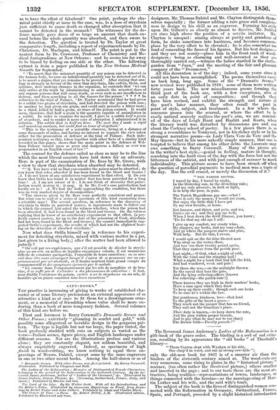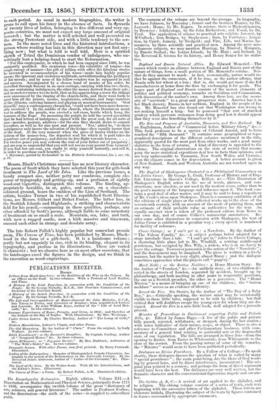GIFT-BOOKS. * THE practice is increasing of giving to works of
established cha- racter or of some literary pretensions an external appearance of so attractive a kind as at once to fit them for a drawingroom orna- ment, or a memorial of friendship whose value shall be more en- during than a book of mere temporary fashion. Several volumes of this kind are before us.
First and foremost is Barry Cornwall's Dramatic Scenes and Other Poems ; exteriorly "gleaming in scarlet and gold," with possibly some allegorical or heraldic design in the gorgeous pat- tern. The type is legible but not too large, the paper tinted, the book profusely studded with cuts on subjects as varied as the verse—Italian scenes, figure pieces, and English landscapes under different seasons. Nor are the illustrations profuse and various alone ; they are constantly elegant, not seldom beautiful, and always exquisitely engraved. Indeed, as specimens of high finish in wood-cutting, we know nothing to equal these en- gravings of Messrs. Dalziel, except some by the same engravers in one or two other recent books. Among the half-dozen or so of .• Dramatic Scenes. With other Poems, now first printed. By Barry Cornwall. Illustrated. Published by Chapman and Hall.
The Ladies of the Reformation : Memoirs of Distinguished Female Characters, belonging to the period of the Reformation in the Sixteenth Century, By the Re- verend James Anderson, Author of "Ladies of the Covenant," .5-c. Illustrated by James Godwin, George Thomas, 4-c. (Germany, Switzerland, France, Italy, and Spain.] Published by Blackie and Son.
The Lord of the Isles. By Sir Walter Scott. With all his Introductions, and the Editor's Notes. Illustrated by numerous Engravings on Wood, from Draw- ings by Birket Foster and John Gilbert. Published by Adam and Charles Black. The Course of Time : a Poem. By Robert Pollok, A.M. Illustrated edition. Published by Blackwood and Sons. designers, Mr. Thomas Dalziel and Mr. Clayton distinguish them- selves especially ; the former adding a rare grace and complete.. ness in design to his skill as an engraver. Forming his style upon Mr. Gilbert's so closely as almost to deceive, Mr. Dakini yet rises high above the position of a servile imitator. lit Clayton is unequal: aiming always at purity and grandeur of form, he sinks sometimes into hardness, and becomes common- place by the very effort to be elevated ; he is also somewhat too fond of concealing the faces of his figures. But his best designs_ and they are not scanty—place him in the front rank of wood. designers ; being as charming and well-invented as they are thoroughly carried out,—witness the ladies startled in the castle_ garden from " Juan," and the meeting of the fair and pleasant company of the " Decameron." All this decoration is of the day ; indeed, some years since it could not have been accomplished. The poems themselves Carry us back long, long ago. Some of the " Dramatic Scenes " now revised were published in 1819 ; some of them were 'written forty, years back. The new miscellaneous poems forming the third part of the book are, with a few exceptions, also of an early date in point of composition; and though they have been revised, and exhibit the strength and nature Of the poet's later manner, they often recall the past in point of style, subject, and treatment. In a few where the sensuous passes into the sensual, or where the effort to be easily natural scarcely realizes the poet's aim, we are remind- ed of the days of Leigh Hunt and Hazlitt and Keats, when the literary world was disturbed by discussions pro and con about the Cockney school of poetry. In a few pieces there is so strong a resemblance to Tennyson, not in his richer style or in his strongest narrative poems—as Lady Clara Vere de Vere and the May Queen—but in his more nakedly simple manner, that one is tempted to believe that among his other debts the Laureate may owe something to Barry Cornwall. Many of the pieces are in the writer's best style,—genial in feeling, mature in thought, searching into the hard vices of the day with the force but not the bitterness of the satirist, and with just enough of manner to mark individuality. This picture seems to have been struck off when the question of parochial payments to medical men was a topic of the day. Has the evil ceased, or merely the discussion of it ?
" THE PARISH DOCTOR.
I travel by day, I travel by night, In the blistering sun, in the drenching rain ; And my only pleasure, in dark or light, Is to help the poor, in pain.
The Parish Magnifieoes pay me—what ? Were it only the money, I would not roam, But enjoy the little that I have got By my own fireside, at home.
But hunger, and thirst, and pain, and wo, Entice me on ; and they pay me well, When I beat down the devil Disease, you know; 'Tis for that my old age I sell : I give up my comfort, my crusty wine My slippers, my books, and my easy-chair, And go where the paupers starve and pine, With help. But for this, I swear,
I would spit on the fat false bloated men Who strut on the vestry-floor, And toss 'em their twenty pound again, That they squeeze from the parish poor.
Last night,-0 God, what a night of cold, With the wind and the stinging hail! What a night for a lamb that had left the fold, And had wandered, weak and pale !
Yet there she was,—on the midnight thrown By the rascal that bars the gate, And the lying relieving-officer (known For relieving—the parish-rate !) These knaves they are high in their masters' books, Have a sum upon which they draw To keep up their credit ; though each one looks To be sure he's within the law.
But gentleness, kindness, love—that lend To the gifts of the heart a grace—
They reach not the pauper that has no friend, They suit not the Guardian's place.
Their duty is known,—to keep down the rate, And the poor within proper bounds,
And to pay (that he may not be too elate) The Doctor with—Twenty pounds ! "
The Reverend James Anderson's Ladies of the Reformation is a gift-book of the grave order. The binding is a sort of sad crim- son, recalling by its appearance the " old books " of Theobald's library-
" There Caxton slept with Wynkyn at his side, One clasp'd in wood, and one in strong cow-hide ";
only the old-new book for 1857 is of a smarter air than the binders of the sixteenth century aimed at. The wood-cuts are very numerous, some rising to plates in the " historical picture " manner, (too often rather the theatrical picture,) others smaller and inserted in the page; and to our taste these are the most at- tractive, being realities—representations of towns, landscapes, or things connected with the heroine—as the marriage-ring of Mar- tin Luther and his wife, and the said wife's tomb.
The subject of the book is the lives of distinguished women con- nected with the Reformation in Germany, Switzerland, France, Spain, and Portugal, preceded by a slight historical introduction
to each period. As usual in modern biographies, the writer is prone to call upon his fancy in the absence of facts. In dpwards of twenty lives of ladies, belonging to five different and very op- posite countries, we must not expect any large amount of original research ; but the matter is well selected and well presented on the strong Protestant aide, and with a little tendency to the ser- mon. In the more noted lives and the historical introductions, a person whose reading has lain in this direction may not find any- thing new ; but what is told is well told. Here is a spirited sketch of Tetzel the Dominican vendor of indulgences, who un- wittingly lent a helping-hand to start the Reformation. "For this employment, in which he had been engaged since 1502, he was eminently qualified. His stentorian voice—his volubility of tongue—his rough energy of manner—his gift of telling with effect the fabulous stories he invented in recommendation of his wares—made him highly popular among the ignorant and credulous multitude, notwithstanding the profligacy of his morals ; and by none of his fellow-venders was he surpassed in zeal and success. Accompanied by a chosen band of monks of his order, he travelled through Saxony in an open carriage, carrying with him two chests, the one containing indulgences, the other the money derived from their sale ; and in such reverence was he held, that on his approaching a town the tidings were announced by the ringing of the church-bells, and there went forth to meet him all the priests, monks, magistrates, scholars, and large numbers of the citizens, carrying banners and playing on musical instruments. God himself,' says a contemporary chronicler, ' could not have been more honour- ably received.' j• In the middle of the church, where the Dominican monk was to address the people, was erected a red cross, beside which hung the banners of the Pope. On mounting the pulpit, he told the crowd assembled that he had letters of indulgence, signed with the great seal, for all sorts of sins—murder, perjury, adultery—for the sins they should desire to commit hereafter, as well as for sins past and present. 'Nor,' added he, do these indulgences only insure the salvation of the living—they equally insure that of the dead. At the very moment when the piece of money tinkles on the bottom of the money-box, the departed soul for which it is paid takes its departure out of purgatory, and directs its free flight towards heaven For twelve pence you may redeem the soul of your father out of purgatory and are you so ungrateful that you will not rescue your parent from torment ! If you had but one coat, you ought to strip yourself instantly, and sell it, in order to purchase such benefits.' "
+
p. 17. Myeomus, quoted by Seckendorf in his Historia Lutheran ismi, lin. i. sec. vii.
Messrs. Black's Christmas annual has no new literary character. The poem of Scott which they have selected this year for gift-book treatment is The Lord of the Isles. Like the previous issues, a handy compact size, neither petty nor cumbrous, complete ele- gance of typography and getting-up, and a profusion of sightly wood-cut vignettes, distinguish this volume. The binding, ap- propriately heraldic, in or, gules, and azure, on a chocolate- coloured ground, bears the emblem of the Lion of Scotland. The artists, besides Turner in two of his republished Scott Illustra- tions, are Messrs. Gilbert and Birket Foster. The latter has, in the Scottish Islands and Highlands, a striking and characteristic field for his pencil,—surpassing in these qualities, perhaps, any other afforded by Scott's poems, although liable to some monotony of treatment on so small a scale. Mountain, sea, lake, and tarn, with now a rugged castle, now a kirk massive and timeworn, succeed each other in strange and desolate array.
The late Robert Pollok's highly popular but somewhat prosaic poem, The Course of Time, has been published by Messrs. Black- wood in the form of a gift-book. It is a handsome volume ; portly but not ungainly in size, rich in its binding, elegant in its typography, and profuse in its illustrations. These are varied in character ; but we observe here as on most other occasions, that the landscapes excel the figures in the design, and we think in the execution as wood-engravings.

































 Previous page
Previous page